Accounting in Climate Change
VerifiedAdded on 2023/06/13
|8
|2024
|165
AI Summary
This research proposes the importance of paying close attention to aspects pertaining climate change and the trend of emissions behavior as well as the significance of interdisciplinary standpoints in environmental and social accounting. The perspectives on challenges intricated in carbon dioxide and GHG accounting are based on information gained from Air New Zealand. The paper encompasses the different meanings attributed to carbon accounting by various people and communities in all the aspects including political, social, environment, financial and physical. The research also explores BHP Billiton's environmental issues and the type of projects that attract the attention of media in BHP Billiton relating to environmental issues as well as social issues.
Contribute Materials
Your contribution can guide someone’s learning journey. Share your
documents today.
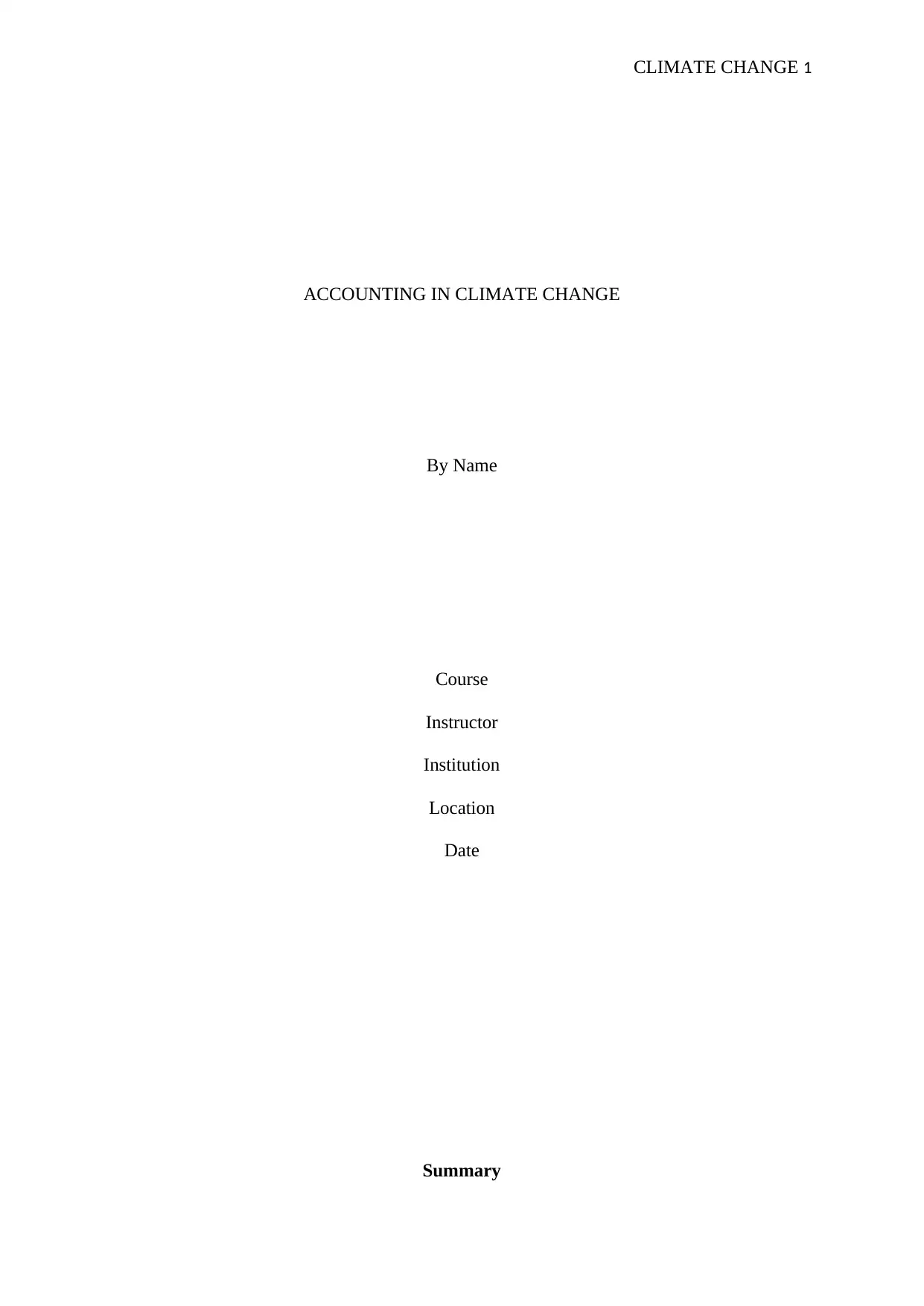
CLIMATE CHANGE 1
ACCOUNTING IN CLIMATE CHANGE
By Name
Course
Instructor
Institution
Location
Date
Summary
ACCOUNTING IN CLIMATE CHANGE
By Name
Course
Instructor
Institution
Location
Date
Summary
Secure Best Marks with AI Grader
Need help grading? Try our AI Grader for instant feedback on your assignments.
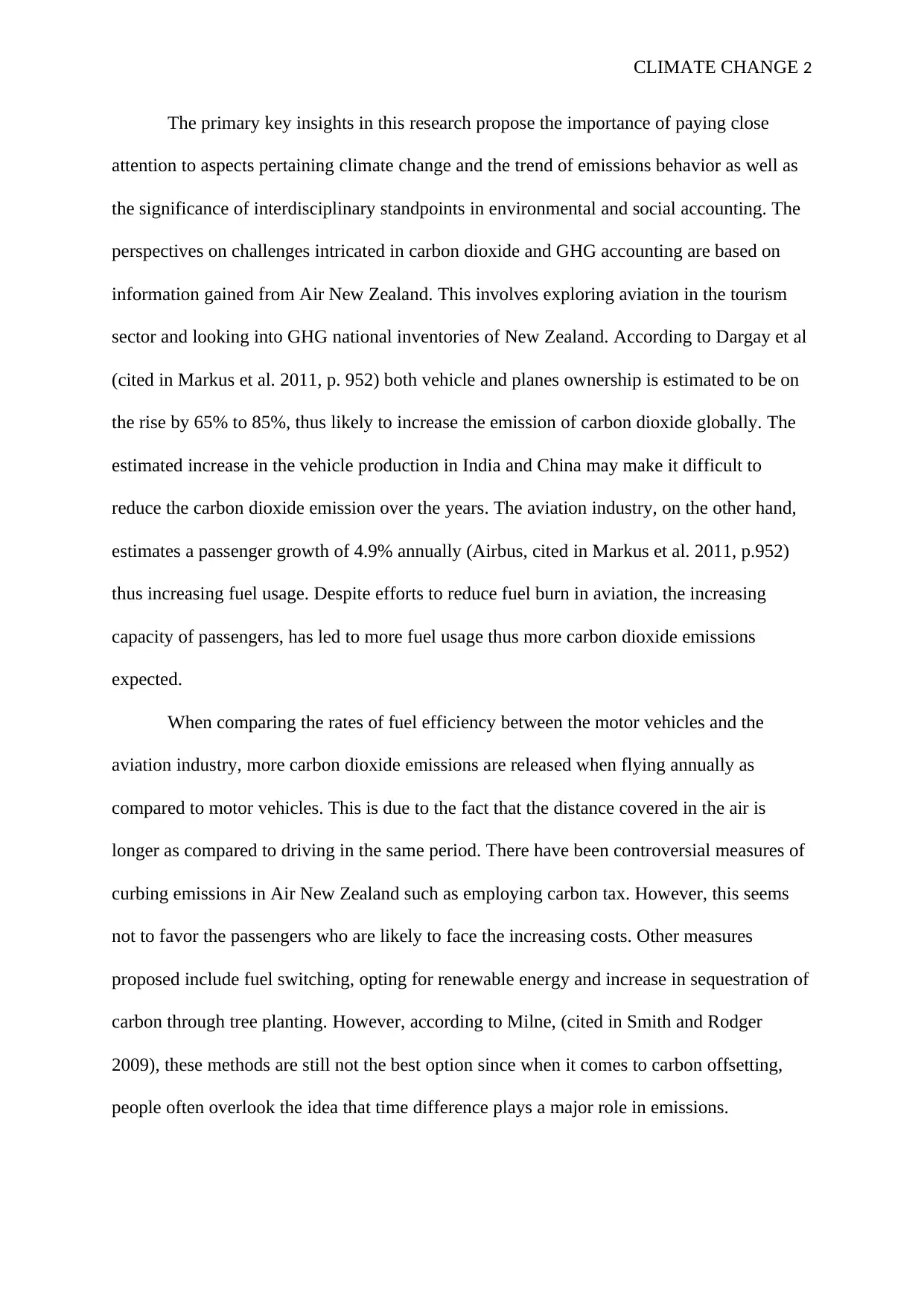
CLIMATE CHANGE 2
The primary key insights in this research propose the importance of paying close
attention to aspects pertaining climate change and the trend of emissions behavior as well as
the significance of interdisciplinary standpoints in environmental and social accounting. The
perspectives on challenges intricated in carbon dioxide and GHG accounting are based on
information gained from Air New Zealand. This involves exploring aviation in the tourism
sector and looking into GHG national inventories of New Zealand. According to Dargay et al
(cited in Markus et al. 2011, p. 952) both vehicle and planes ownership is estimated to be on
the rise by 65% to 85%, thus likely to increase the emission of carbon dioxide globally. The
estimated increase in the vehicle production in India and China may make it difficult to
reduce the carbon dioxide emission over the years. The aviation industry, on the other hand,
estimates a passenger growth of 4.9% annually (Airbus, cited in Markus et al. 2011, p.952)
thus increasing fuel usage. Despite efforts to reduce fuel burn in aviation, the increasing
capacity of passengers, has led to more fuel usage thus more carbon dioxide emissions
expected.
When comparing the rates of fuel efficiency between the motor vehicles and the
aviation industry, more carbon dioxide emissions are released when flying annually as
compared to motor vehicles. This is due to the fact that the distance covered in the air is
longer as compared to driving in the same period. There have been controversial measures of
curbing emissions in Air New Zealand such as employing carbon tax. However, this seems
not to favor the passengers who are likely to face the increasing costs. Other measures
proposed include fuel switching, opting for renewable energy and increase in sequestration of
carbon through tree planting. However, according to Milne, (cited in Smith and Rodger
2009), these methods are still not the best option since when it comes to carbon offsetting,
people often overlook the idea that time difference plays a major role in emissions.
The primary key insights in this research propose the importance of paying close
attention to aspects pertaining climate change and the trend of emissions behavior as well as
the significance of interdisciplinary standpoints in environmental and social accounting. The
perspectives on challenges intricated in carbon dioxide and GHG accounting are based on
information gained from Air New Zealand. This involves exploring aviation in the tourism
sector and looking into GHG national inventories of New Zealand. According to Dargay et al
(cited in Markus et al. 2011, p. 952) both vehicle and planes ownership is estimated to be on
the rise by 65% to 85%, thus likely to increase the emission of carbon dioxide globally. The
estimated increase in the vehicle production in India and China may make it difficult to
reduce the carbon dioxide emission over the years. The aviation industry, on the other hand,
estimates a passenger growth of 4.9% annually (Airbus, cited in Markus et al. 2011, p.952)
thus increasing fuel usage. Despite efforts to reduce fuel burn in aviation, the increasing
capacity of passengers, has led to more fuel usage thus more carbon dioxide emissions
expected.
When comparing the rates of fuel efficiency between the motor vehicles and the
aviation industry, more carbon dioxide emissions are released when flying annually as
compared to motor vehicles. This is due to the fact that the distance covered in the air is
longer as compared to driving in the same period. There have been controversial measures of
curbing emissions in Air New Zealand such as employing carbon tax. However, this seems
not to favor the passengers who are likely to face the increasing costs. Other measures
proposed include fuel switching, opting for renewable energy and increase in sequestration of
carbon through tree planting. However, according to Milne, (cited in Smith and Rodger
2009), these methods are still not the best option since when it comes to carbon offsetting,
people often overlook the idea that time difference plays a major role in emissions.
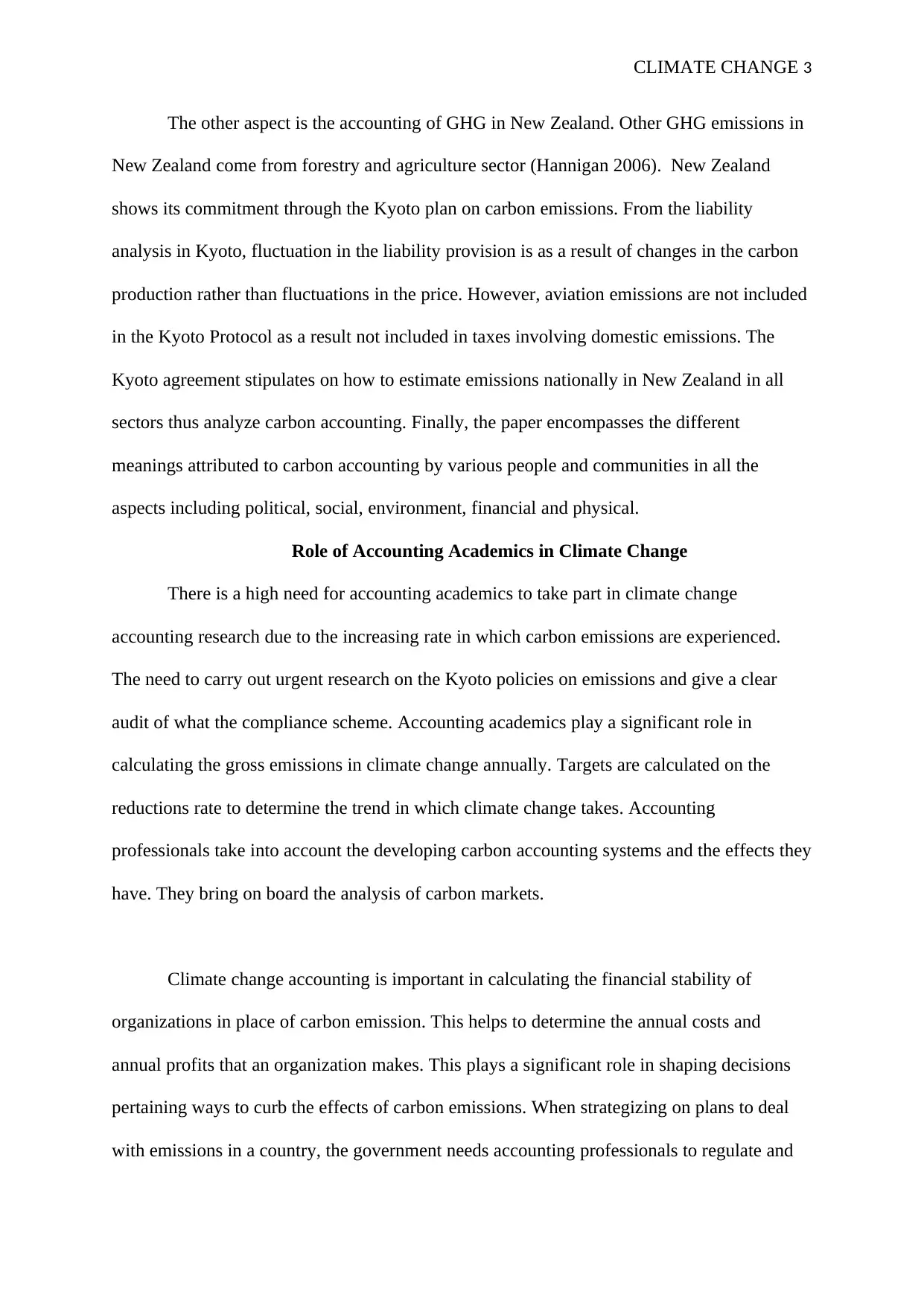
CLIMATE CHANGE 3
The other aspect is the accounting of GHG in New Zealand. Other GHG emissions in
New Zealand come from forestry and agriculture sector (Hannigan 2006). New Zealand
shows its commitment through the Kyoto plan on carbon emissions. From the liability
analysis in Kyoto, fluctuation in the liability provision is as a result of changes in the carbon
production rather than fluctuations in the price. However, aviation emissions are not included
in the Kyoto Protocol as a result not included in taxes involving domestic emissions. The
Kyoto agreement stipulates on how to estimate emissions nationally in New Zealand in all
sectors thus analyze carbon accounting. Finally, the paper encompasses the different
meanings attributed to carbon accounting by various people and communities in all the
aspects including political, social, environment, financial and physical.
Role of Accounting Academics in Climate Change
There is a high need for accounting academics to take part in climate change
accounting research due to the increasing rate in which carbon emissions are experienced.
The need to carry out urgent research on the Kyoto policies on emissions and give a clear
audit of what the compliance scheme. Accounting academics play a significant role in
calculating the gross emissions in climate change annually. Targets are calculated on the
reductions rate to determine the trend in which climate change takes. Accounting
professionals take into account the developing carbon accounting systems and the effects they
have. They bring on board the analysis of carbon markets.
Climate change accounting is important in calculating the financial stability of
organizations in place of carbon emission. This helps to determine the annual costs and
annual profits that an organization makes. This plays a significant role in shaping decisions
pertaining ways to curb the effects of carbon emissions. When strategizing on plans to deal
with emissions in a country, the government needs accounting professionals to regulate and
The other aspect is the accounting of GHG in New Zealand. Other GHG emissions in
New Zealand come from forestry and agriculture sector (Hannigan 2006). New Zealand
shows its commitment through the Kyoto plan on carbon emissions. From the liability
analysis in Kyoto, fluctuation in the liability provision is as a result of changes in the carbon
production rather than fluctuations in the price. However, aviation emissions are not included
in the Kyoto Protocol as a result not included in taxes involving domestic emissions. The
Kyoto agreement stipulates on how to estimate emissions nationally in New Zealand in all
sectors thus analyze carbon accounting. Finally, the paper encompasses the different
meanings attributed to carbon accounting by various people and communities in all the
aspects including political, social, environment, financial and physical.
Role of Accounting Academics in Climate Change
There is a high need for accounting academics to take part in climate change
accounting research due to the increasing rate in which carbon emissions are experienced.
The need to carry out urgent research on the Kyoto policies on emissions and give a clear
audit of what the compliance scheme. Accounting academics play a significant role in
calculating the gross emissions in climate change annually. Targets are calculated on the
reductions rate to determine the trend in which climate change takes. Accounting
professionals take into account the developing carbon accounting systems and the effects they
have. They bring on board the analysis of carbon markets.
Climate change accounting is important in calculating the financial stability of
organizations in place of carbon emission. This helps to determine the annual costs and
annual profits that an organization makes. This plays a significant role in shaping decisions
pertaining ways to curb the effects of carbon emissions. When strategizing on plans to deal
with emissions in a country, the government needs accounting professionals to regulate and
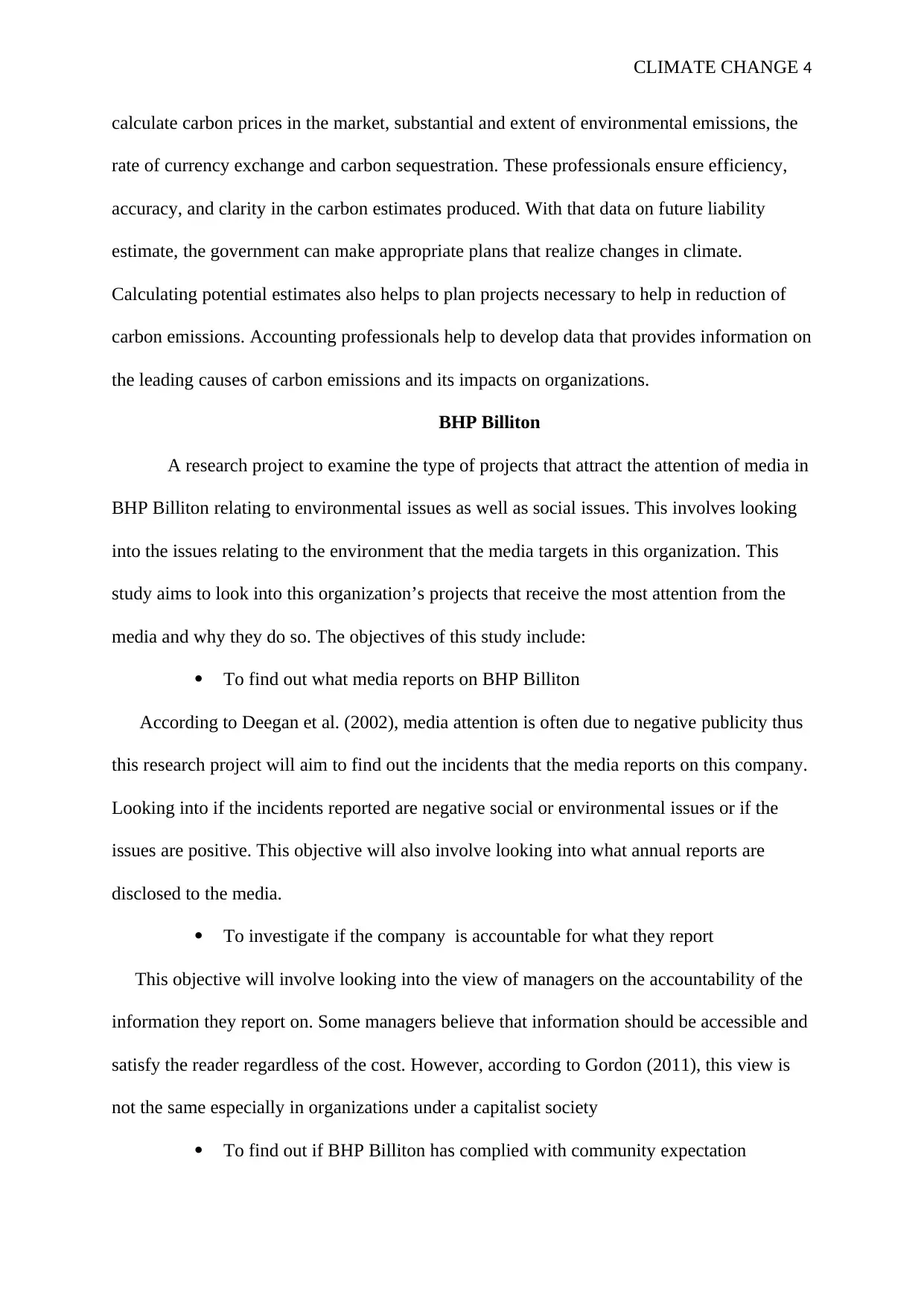
CLIMATE CHANGE 4
calculate carbon prices in the market, substantial and extent of environmental emissions, the
rate of currency exchange and carbon sequestration. These professionals ensure efficiency,
accuracy, and clarity in the carbon estimates produced. With that data on future liability
estimate, the government can make appropriate plans that realize changes in climate.
Calculating potential estimates also helps to plan projects necessary to help in reduction of
carbon emissions. Accounting professionals help to develop data that provides information on
the leading causes of carbon emissions and its impacts on organizations.
BHP Billiton
A research project to examine the type of projects that attract the attention of media in
BHP Billiton relating to environmental issues as well as social issues. This involves looking
into the issues relating to the environment that the media targets in this organization. This
study aims to look into this organization’s projects that receive the most attention from the
media and why they do so. The objectives of this study include:
To find out what media reports on BHP Billiton
According to Deegan et al. (2002), media attention is often due to negative publicity thus
this research project will aim to find out the incidents that the media reports on this company.
Looking into if the incidents reported are negative social or environmental issues or if the
issues are positive. This objective will also involve looking into what annual reports are
disclosed to the media.
To investigate if the company is accountable for what they report
This objective will involve looking into the view of managers on the accountability of the
information they report on. Some managers believe that information should be accessible and
satisfy the reader regardless of the cost. However, according to Gordon (2011), this view is
not the same especially in organizations under a capitalist society
To find out if BHP Billiton has complied with community expectation
calculate carbon prices in the market, substantial and extent of environmental emissions, the
rate of currency exchange and carbon sequestration. These professionals ensure efficiency,
accuracy, and clarity in the carbon estimates produced. With that data on future liability
estimate, the government can make appropriate plans that realize changes in climate.
Calculating potential estimates also helps to plan projects necessary to help in reduction of
carbon emissions. Accounting professionals help to develop data that provides information on
the leading causes of carbon emissions and its impacts on organizations.
BHP Billiton
A research project to examine the type of projects that attract the attention of media in
BHP Billiton relating to environmental issues as well as social issues. This involves looking
into the issues relating to the environment that the media targets in this organization. This
study aims to look into this organization’s projects that receive the most attention from the
media and why they do so. The objectives of this study include:
To find out what media reports on BHP Billiton
According to Deegan et al. (2002), media attention is often due to negative publicity thus
this research project will aim to find out the incidents that the media reports on this company.
Looking into if the incidents reported are negative social or environmental issues or if the
issues are positive. This objective will also involve looking into what annual reports are
disclosed to the media.
To investigate if the company is accountable for what they report
This objective will involve looking into the view of managers on the accountability of the
information they report on. Some managers believe that information should be accessible and
satisfy the reader regardless of the cost. However, according to Gordon (2011), this view is
not the same especially in organizations under a capitalist society
To find out if BHP Billiton has complied with community expectation
Secure Best Marks with AI Grader
Need help grading? Try our AI Grader for instant feedback on your assignments.
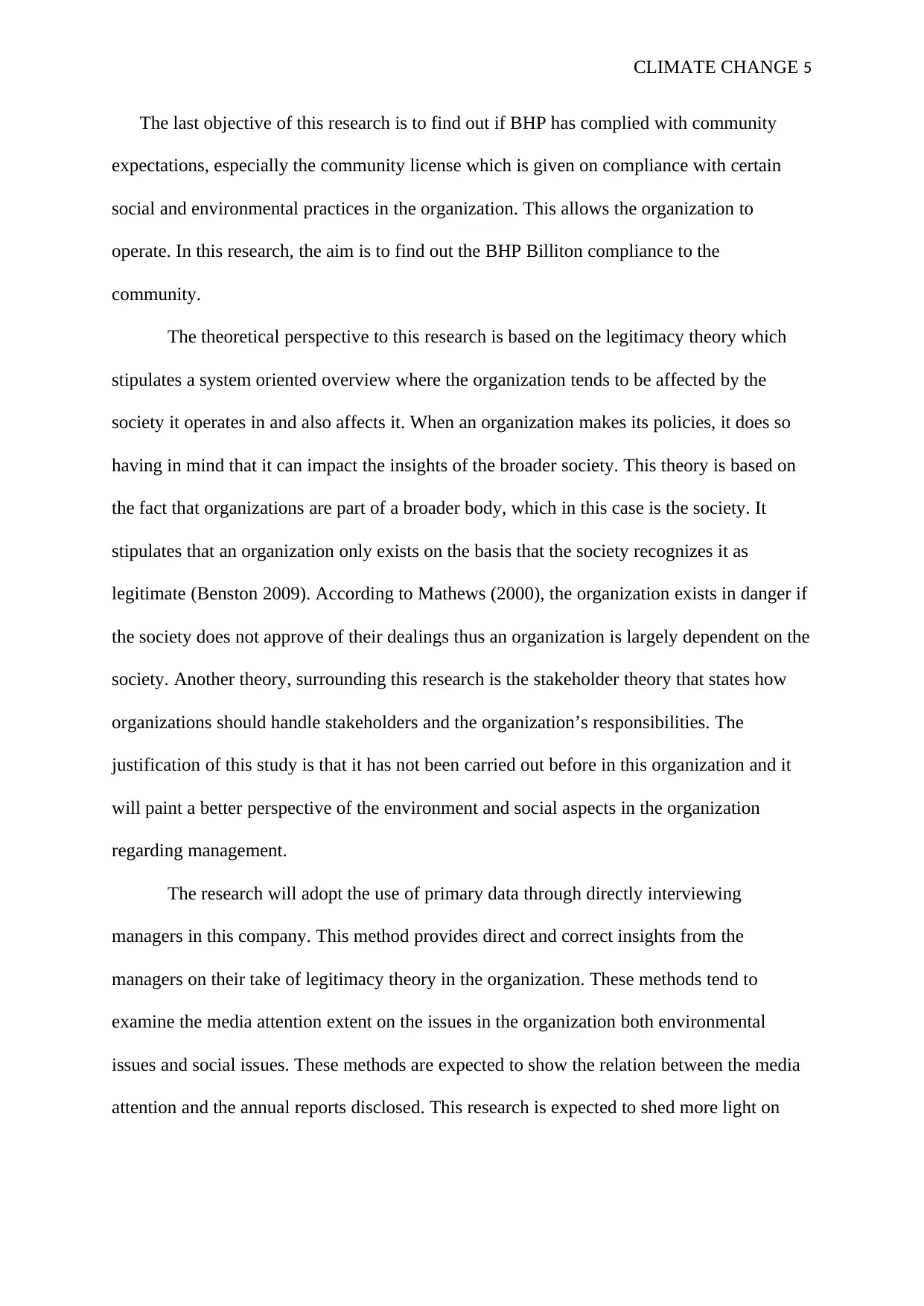
CLIMATE CHANGE 5
The last objective of this research is to find out if BHP has complied with community
expectations, especially the community license which is given on compliance with certain
social and environmental practices in the organization. This allows the organization to
operate. In this research, the aim is to find out the BHP Billiton compliance to the
community.
The theoretical perspective to this research is based on the legitimacy theory which
stipulates a system oriented overview where the organization tends to be affected by the
society it operates in and also affects it. When an organization makes its policies, it does so
having in mind that it can impact the insights of the broader society. This theory is based on
the fact that organizations are part of a broader body, which in this case is the society. It
stipulates that an organization only exists on the basis that the society recognizes it as
legitimate (Benston 2009). According to Mathews (2000), the organization exists in danger if
the society does not approve of their dealings thus an organization is largely dependent on the
society. Another theory, surrounding this research is the stakeholder theory that states how
organizations should handle stakeholders and the organization’s responsibilities. The
justification of this study is that it has not been carried out before in this organization and it
will paint a better perspective of the environment and social aspects in the organization
regarding management.
The research will adopt the use of primary data through directly interviewing
managers in this company. This method provides direct and correct insights from the
managers on their take of legitimacy theory in the organization. These methods tend to
examine the media attention extent on the issues in the organization both environmental
issues and social issues. These methods are expected to show the relation between the media
attention and the annual reports disclosed. This research is expected to shed more light on
The last objective of this research is to find out if BHP has complied with community
expectations, especially the community license which is given on compliance with certain
social and environmental practices in the organization. This allows the organization to
operate. In this research, the aim is to find out the BHP Billiton compliance to the
community.
The theoretical perspective to this research is based on the legitimacy theory which
stipulates a system oriented overview where the organization tends to be affected by the
society it operates in and also affects it. When an organization makes its policies, it does so
having in mind that it can impact the insights of the broader society. This theory is based on
the fact that organizations are part of a broader body, which in this case is the society. It
stipulates that an organization only exists on the basis that the society recognizes it as
legitimate (Benston 2009). According to Mathews (2000), the organization exists in danger if
the society does not approve of their dealings thus an organization is largely dependent on the
society. Another theory, surrounding this research is the stakeholder theory that states how
organizations should handle stakeholders and the organization’s responsibilities. The
justification of this study is that it has not been carried out before in this organization and it
will paint a better perspective of the environment and social aspects in the organization
regarding management.
The research will adopt the use of primary data through directly interviewing
managers in this company. This method provides direct and correct insights from the
managers on their take of legitimacy theory in the organization. These methods tend to
examine the media attention extent on the issues in the organization both environmental
issues and social issues. These methods are expected to show the relation between the media
attention and the annual reports disclosed. This research is expected to shed more light on
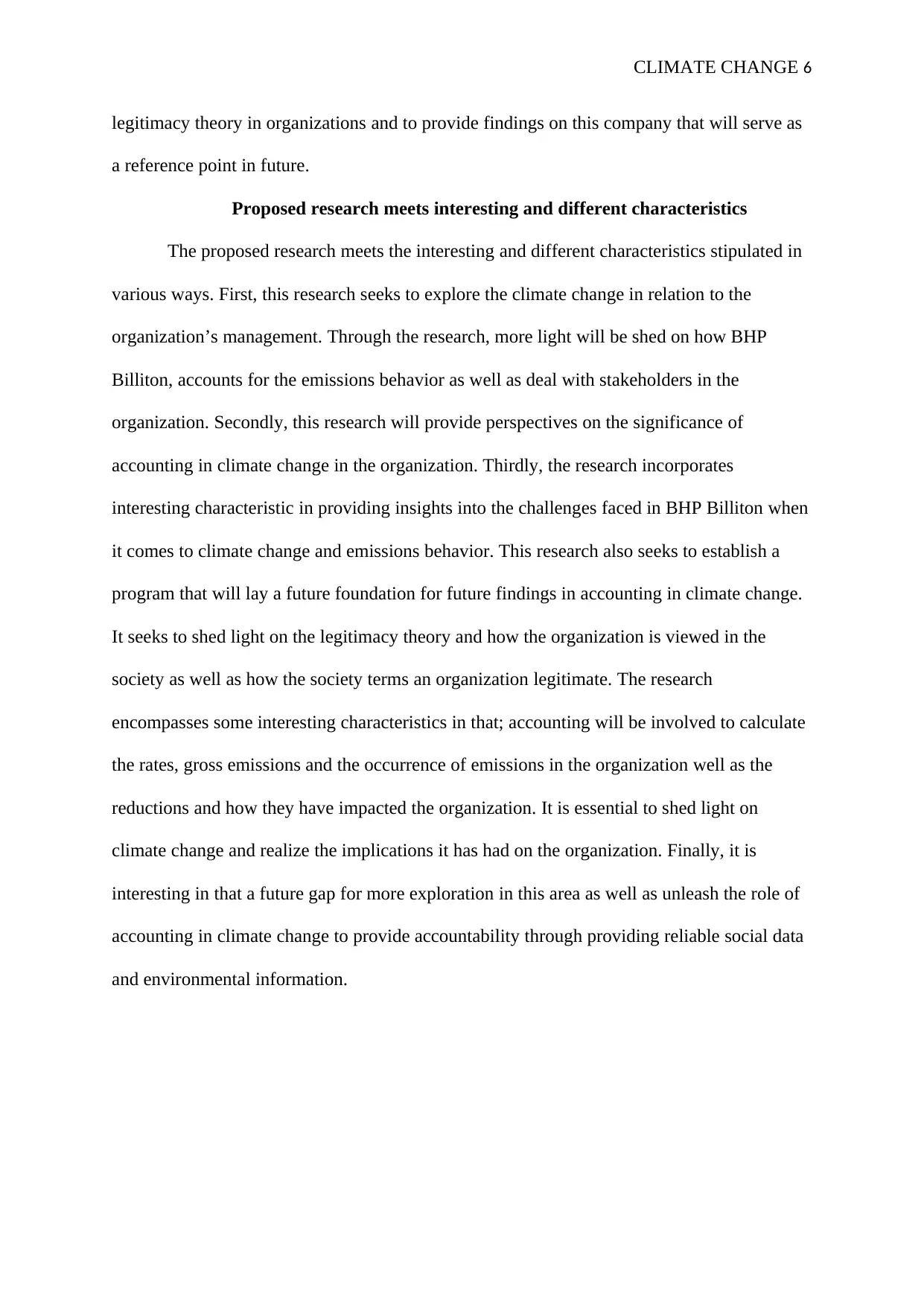
CLIMATE CHANGE 6
legitimacy theory in organizations and to provide findings on this company that will serve as
a reference point in future.
Proposed research meets interesting and different characteristics
The proposed research meets the interesting and different characteristics stipulated in
various ways. First, this research seeks to explore the climate change in relation to the
organization’s management. Through the research, more light will be shed on how BHP
Billiton, accounts for the emissions behavior as well as deal with stakeholders in the
organization. Secondly, this research will provide perspectives on the significance of
accounting in climate change in the organization. Thirdly, the research incorporates
interesting characteristic in providing insights into the challenges faced in BHP Billiton when
it comes to climate change and emissions behavior. This research also seeks to establish a
program that will lay a future foundation for future findings in accounting in climate change.
It seeks to shed light on the legitimacy theory and how the organization is viewed in the
society as well as how the society terms an organization legitimate. The research
encompasses some interesting characteristics in that; accounting will be involved to calculate
the rates, gross emissions and the occurrence of emissions in the organization well as the
reductions and how they have impacted the organization. It is essential to shed light on
climate change and realize the implications it has had on the organization. Finally, it is
interesting in that a future gap for more exploration in this area as well as unleash the role of
accounting in climate change to provide accountability through providing reliable social data
and environmental information.
legitimacy theory in organizations and to provide findings on this company that will serve as
a reference point in future.
Proposed research meets interesting and different characteristics
The proposed research meets the interesting and different characteristics stipulated in
various ways. First, this research seeks to explore the climate change in relation to the
organization’s management. Through the research, more light will be shed on how BHP
Billiton, accounts for the emissions behavior as well as deal with stakeholders in the
organization. Secondly, this research will provide perspectives on the significance of
accounting in climate change in the organization. Thirdly, the research incorporates
interesting characteristic in providing insights into the challenges faced in BHP Billiton when
it comes to climate change and emissions behavior. This research also seeks to establish a
program that will lay a future foundation for future findings in accounting in climate change.
It seeks to shed light on the legitimacy theory and how the organization is viewed in the
society as well as how the society terms an organization legitimate. The research
encompasses some interesting characteristics in that; accounting will be involved to calculate
the rates, gross emissions and the occurrence of emissions in the organization well as the
reductions and how they have impacted the organization. It is essential to shed light on
climate change and realize the implications it has had on the organization. Finally, it is
interesting in that a future gap for more exploration in this area as well as unleash the role of
accounting in climate change to provide accountability through providing reliable social data
and environmental information.
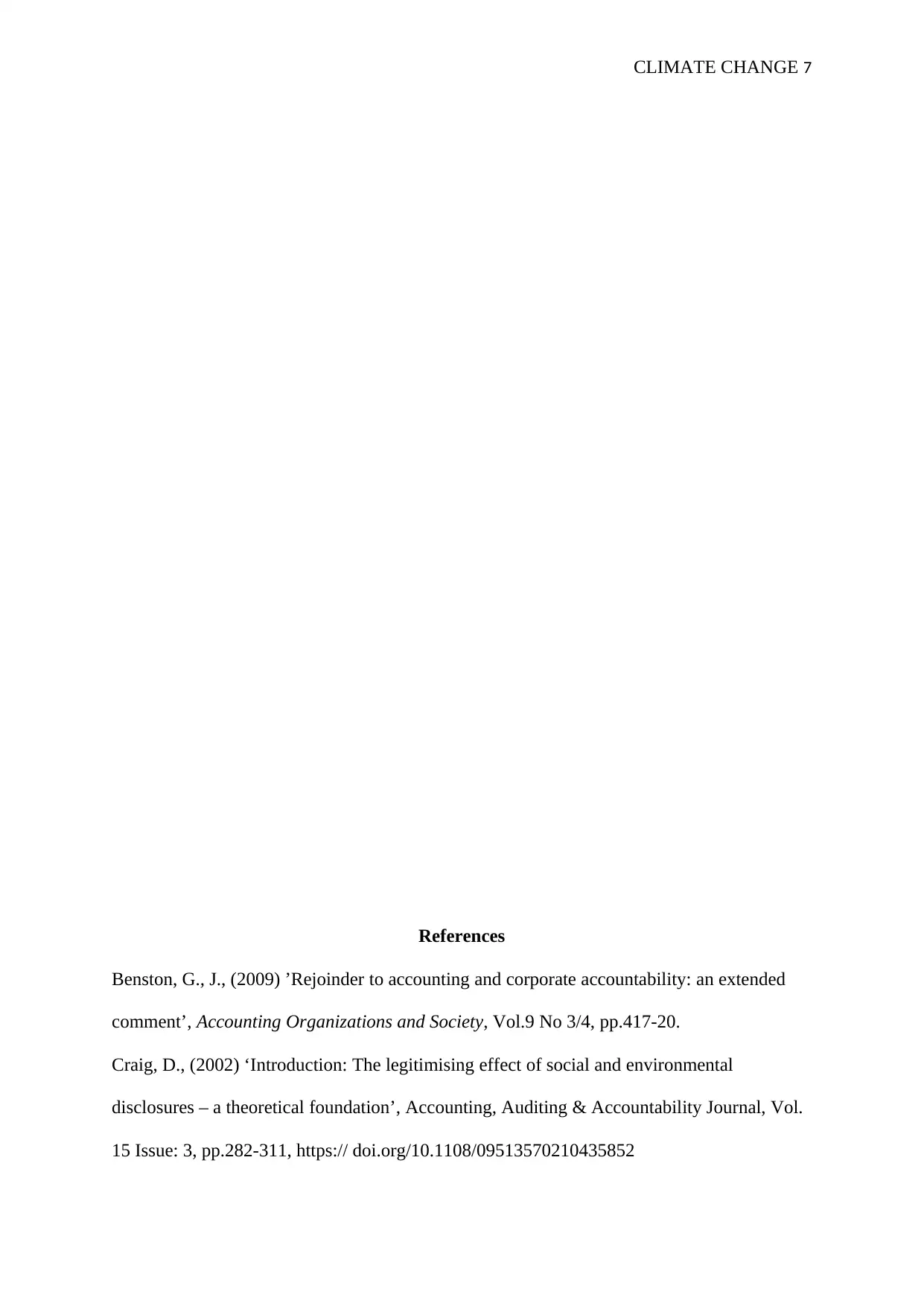
CLIMATE CHANGE 7
References
Benston, G., J., (2009) ’Rejoinder to accounting and corporate accountability: an extended
comment’, Accounting Organizations and Society, Vol.9 No 3/4, pp.417-20.
Craig, D., (2002) ‘Introduction: The legitimising effect of social and environmental
disclosures – a theoretical foundation’, Accounting, Auditing & Accountability Journal, Vol.
15 Issue: 3, pp.282-311, https:// doi.org/10.1108/09513570210435852
References
Benston, G., J., (2009) ’Rejoinder to accounting and corporate accountability: an extended
comment’, Accounting Organizations and Society, Vol.9 No 3/4, pp.417-20.
Craig, D., (2002) ‘Introduction: The legitimising effect of social and environmental
disclosures – a theoretical foundation’, Accounting, Auditing & Accountability Journal, Vol.
15 Issue: 3, pp.282-311, https:// doi.org/10.1108/09513570210435852
Paraphrase This Document
Need a fresh take? Get an instant paraphrase of this document with our AI Paraphraser
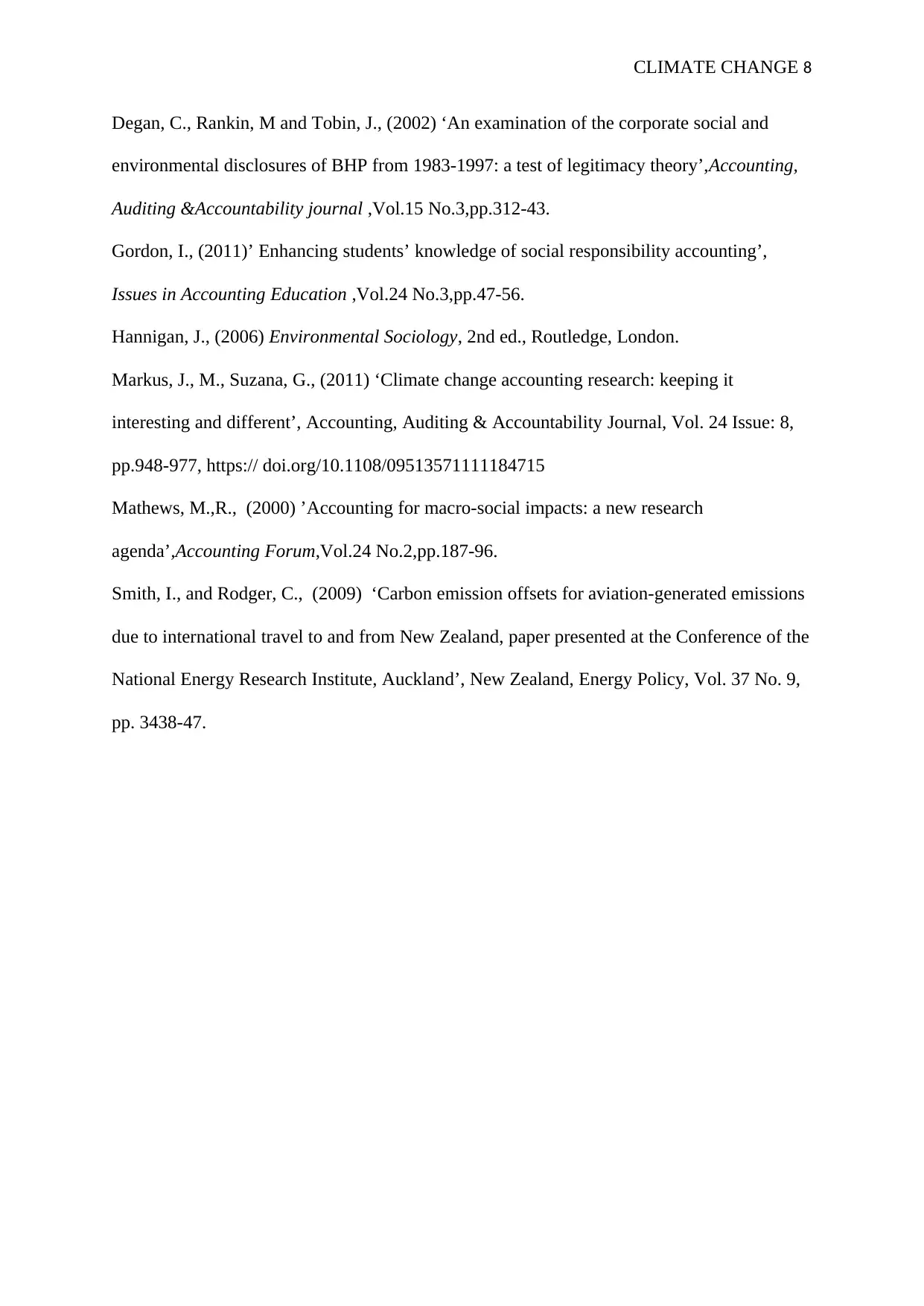
CLIMATE CHANGE 8
Degan, C., Rankin, M and Tobin, J., (2002) ‘An examination of the corporate social and
environmental disclosures of BHP from 1983-1997: a test of legitimacy theory’,Accounting,
Auditing &Accountability journal ,Vol.15 No.3,pp.312-43.
Gordon, I., (2011)’ Enhancing students’ knowledge of social responsibility accounting’,
Issues in Accounting Education ,Vol.24 No.3,pp.47-56.
Hannigan, J., (2006) Environmental Sociology, 2nd ed., Routledge, London.
Markus, J., M., Suzana, G., (2011) ‘Climate change accounting research: keeping it
interesting and different’, Accounting, Auditing & Accountability Journal, Vol. 24 Issue: 8,
pp.948-977, https:// doi.org/10.1108/09513571111184715
Mathews, M.,R., (2000) ’Accounting for macro-social impacts: a new research
agenda’,Accounting Forum,Vol.24 No.2,pp.187-96.
Smith, I., and Rodger, C., (2009) ‘Carbon emission offsets for aviation-generated emissions
due to international travel to and from New Zealand, paper presented at the Conference of the
National Energy Research Institute, Auckland’, New Zealand, Energy Policy, Vol. 37 No. 9,
pp. 3438-47.
Degan, C., Rankin, M and Tobin, J., (2002) ‘An examination of the corporate social and
environmental disclosures of BHP from 1983-1997: a test of legitimacy theory’,Accounting,
Auditing &Accountability journal ,Vol.15 No.3,pp.312-43.
Gordon, I., (2011)’ Enhancing students’ knowledge of social responsibility accounting’,
Issues in Accounting Education ,Vol.24 No.3,pp.47-56.
Hannigan, J., (2006) Environmental Sociology, 2nd ed., Routledge, London.
Markus, J., M., Suzana, G., (2011) ‘Climate change accounting research: keeping it
interesting and different’, Accounting, Auditing & Accountability Journal, Vol. 24 Issue: 8,
pp.948-977, https:// doi.org/10.1108/09513571111184715
Mathews, M.,R., (2000) ’Accounting for macro-social impacts: a new research
agenda’,Accounting Forum,Vol.24 No.2,pp.187-96.
Smith, I., and Rodger, C., (2009) ‘Carbon emission offsets for aviation-generated emissions
due to international travel to and from New Zealand, paper presented at the Conference of the
National Energy Research Institute, Auckland’, New Zealand, Energy Policy, Vol. 37 No. 9,
pp. 3438-47.
1 out of 8
Related Documents
Your All-in-One AI-Powered Toolkit for Academic Success.
+13062052269
info@desklib.com
Available 24*7 on WhatsApp / Email
![[object Object]](/_next/static/media/star-bottom.7253800d.svg)
Unlock your academic potential
© 2024 | Zucol Services PVT LTD | All rights reserved.





